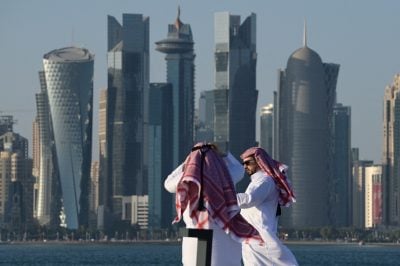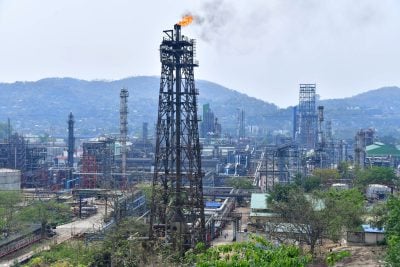The cost of living is the biggest short-term risk facing the global economy, with energy and food inflation likely to persist for the next two years, warns the World Economic Forum ahead of its annual Davos meeting.
However, WEF’s Global Risks Report 2023 – which makes for sobering reading for policymakers convening in the Swiss resort from 16 January – argues that policymakers must not ignore longer-term challenges if the world is avoid the disastrous risk of emerging “polycrises”, in which disparate crises interact for an overall impact that far exceeds the sum of each part.
WEF’s report, produced in partnership with Marsh McLennan and Zurich Insurance Group, draws on the views of over 1,200 global risk experts, policymakers and industry leaders.
Risk of recession, growing debt distress, continued cost of living crisis…
The global pandemic and the Russia-Ukraine war have triggered global inflation and rising energy and food and security prices, and the report authors say that follow-on risks will dominate the next two years, including the risk of recession; growing debt distress; a continued cost of living crisis; polarised societies enabled by disinformation and misinformation; a hiatus on rapid climate action; and zero-sum geo-economic warfare.
“The economic aftereffects of Covid-19 and the war in Ukraine have ushered in skyrocketing inflation, a rapid normalisation of monetary policies and started a low-growth, low-investment era. Governments and central banks could face stubborn inflationary pressures over the next two years, not least given the potential for a prolonged war in Ukraine, continued bottlenecks from a lingering pandemic, and economic warfare spurring supply chain decoupling,” the authors write.
“Downside risks to the economic outlook also loom large. A miscalibration between monetary and fiscal policies will raise the likelihood of liquidity shocks, signaling a more prolonged economic downturn and debt distress on a global scale. Continued supply-driven inflation could lead to stagflation, the socioeconomic consequences of which could be severe, given an unprecedented interaction with historically high levels of public debt.
“Global economic fragmentation, geopolitical tensions and rockier restructuring could contribute to widespread debt distress in the next 10 years. Even if some economies experience a softer-than expected economic landing, the end of the low interest rate era will have significant ramifications for governments, businesses and individuals.”

Most vulnerable are suffering
Short-term crises risk undermining efforts to tackle both unforeseen and anticipated longer-term risks, notably those related to climate change, biodiversity and investment in human capital, the report says.
“The short-term risk landscape is dominated by energy, food, debt and disasters,” commented Saadia Zahidi, managing director at the World Economic Forum at the launch of the report.
“Those that are already the most vulnerable are suffering – and in the face of multiple crises, those who qualify as vulnerable are rapidly expanding, in rich and poor countries alike. In this already toxic mix of known and rising global risks, a new shock event, from a new military conflict to a new virus, could become unmanageable. Climate and human development therefore must be at the core of concerns of global leaders to boost resilience against future shocks.”
Spectre of “polycrises”
The authors say that the potential combination of several emerging threats could spark the risk of polycrises.
“Concurrent shocks, deeply interconnected risks and eroding resilience are giving rise to the risk of polycrises… Eroding geopolitical cooperation will have ripple effects across the global risks landscape over the medium term, including contributing to a potential polycrisis of interrelated environmental, geopolitical and socioeconomic risks relating to the supply of and demand for natural resources.”
In particular, an inability to deal with current economic headwinds could have a disastrous impact on global efforts to combat climate change.
“The coming years will present tough trade-offs for governments facing competing concerns for society, the environment and security. Already, short-term geo-economic risks are putting net-zero commitments to the test and have exposed a gap between what is scientifically necessary and politically palatable,” the authors note.
The report looks at how unresolved tensions could also spark resource rivalries, as a cluster of interrelated environmental, geopolitical and socioeconomic risks disrupt supply and demand for natural resources.
In the best-case scenario, say the authors, resource collaboration could forge effective climate action measures and flexible supply chains which largely absorb the impacts of climate change on food production. In the worst, however, competition for critical metals and minerals could be joined by climate-induced shortages in food and water, “resulting in a truly global, multi-resource crisis, with widespread socio-economic impacts that exceed those faced in other futures in both scope and scale, including famine and water scarcity refugees”.
Call for decisive collective action
The report calls on leaders to act collectively and decisively in tackling short- and long-term concerns.
“The world’s collective focus is being channeled into the ‘survival’ of today’s crises: cost of living, social and political polarisation, food and energy supplies, tepid growth, and geopolitical confrontation, among others,” said WEF’s Zahidi.
“Yet much-needed attention and resources are being diverted from newly emerging or rapidly accelerating risks to natural ecosystems, human health, security, digital rights and economic stability that could become crises and catastrophes in the next decade.”
Want to continue reading? Subscribe today.
You've read all your free articles for this month! Subscribe now to enjoy full access to our content.
Digital Monthly
£8.00 / month
Receive full unlimited access to our articles, opinions, podcasts and more.
Digital Yearly
£70.00 / year
Our best value offer - save £26 and gain access to all of our digital content for an entire year!

 Sign in with Google
Sign in with Google 





